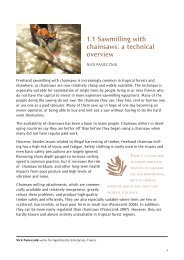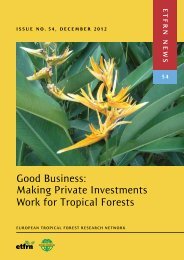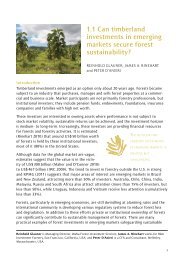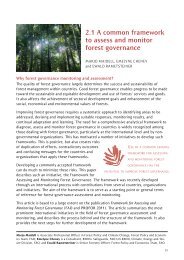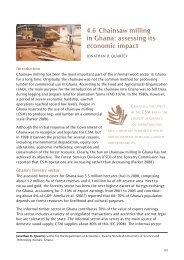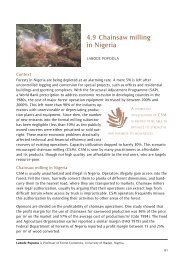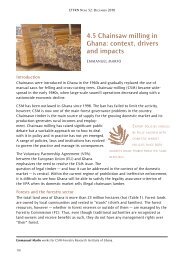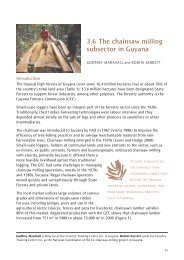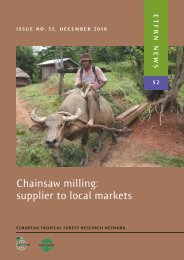Chainsaw milling: supplier to local markets - European Tropical ...
Chainsaw milling: supplier to local markets - European Tropical ...
Chainsaw milling: supplier to local markets - European Tropical ...
Create successful ePaper yourself
Turn your PDF publications into a flip-book with our unique Google optimized e-Paper software.
156<br />
ETFRN NEws 52: DEcEmbER 2010<br />
thousands of people in Ghana. bridging the numerous conflicting <strong>local</strong> and global<br />
interests that characterize Csm requires a meaningful and inclusive dialogue by all<br />
stakeholders.<br />
<strong>Chainsaw</strong> operations need <strong>to</strong> be regulated, either through effective enforcement of the<br />
current ban or by being integrated in<strong>to</strong> mainstream forest management and operations.<br />
Declaring that Csm is illegal without addressing the timber <strong>markets</strong> that sell its illegal<br />
products is not realistic or effective. legalizing a practice that is clearly operating at<br />
unsustainable levels is also not an option.<br />
The way forward<br />
For any policy option <strong>to</strong> be effective, it must optimize the advantages of Csm while<br />
reducing adverse environmental and socio-economic effects. policy should also address<br />
the fac<strong>to</strong>rs that drive Csm. The domestic market demand for lumber has been identified<br />
as the major driver for illegal Csm in Ghana. without addressing this issue within<br />
the context of the production and supply of legal timber, it may be impossible <strong>to</strong> develop<br />
and enforce an adequate Csm policy. because of the significance of Csm, solutions must<br />
be discussed and agreed <strong>to</strong> by a wide range of ac<strong>to</strong>rs. The<br />
illegal nature of the practice makes it difficult <strong>to</strong> formally<br />
engage chainsaw millers in dialogue, but this is necessary <strong>to</strong><br />
build support for sustainable solutions.<br />
since 2007, a process of multi-stakeholder dialogue has<br />
involved both legal and illegal ac<strong>to</strong>rs and aims <strong>to</strong> find a<br />
consensus on the Csm challenge. 3 The process aligns with<br />
the national Forest Forum and Vpa implementation processes<br />
and so far has increased common understanding of the main issues and identified<br />
acceptable options <strong>to</strong> address Csm and domestic market supply.<br />
participants in the process agreed that, based on lessons learned from the Csm ban and<br />
experiences elsewhere in africa, the transformation of Csm in<strong>to</strong> regulated artisanal<br />
<strong>milling</strong> 4 is worth exploring. The way forward lies in reconciling the demand for adequate<br />
legal timber for the domestic market with the sustainable production capacity of the<br />
country’s forest resources. Export policies should be fully aligned with domestic market<br />
policies since both <strong>markets</strong> draw timber from the same resource. ultimately, supplies may<br />
have <strong>to</strong> come from plantations or imports. For now, the process considers three possible<br />
policy directions:<br />
• option 1: sawmills alone <strong>to</strong> supply the domestic market with legal timber. This<br />
implies the maintenance and full enforcement of the Csm ban, and the development<br />
of a range of options <strong>to</strong> encourage sawmills <strong>to</strong> supply domestic <strong>markets</strong>.<br />
• option 2: sawmills and artisanal millers <strong>to</strong> supply the domestic market with legal<br />
timber. This implies allocation of harvesting rights <strong>to</strong> artisanal millers and the<br />
logging industry. options must be developed <strong>to</strong> create equitable conditions for<br />
sawmillers and other participants in the domestic market.<br />
• option 3: artisanal millers alone supply the domestic market with legal timber.<br />
This implies allocation of harvesting rights <strong>to</strong> artisanal millers.



